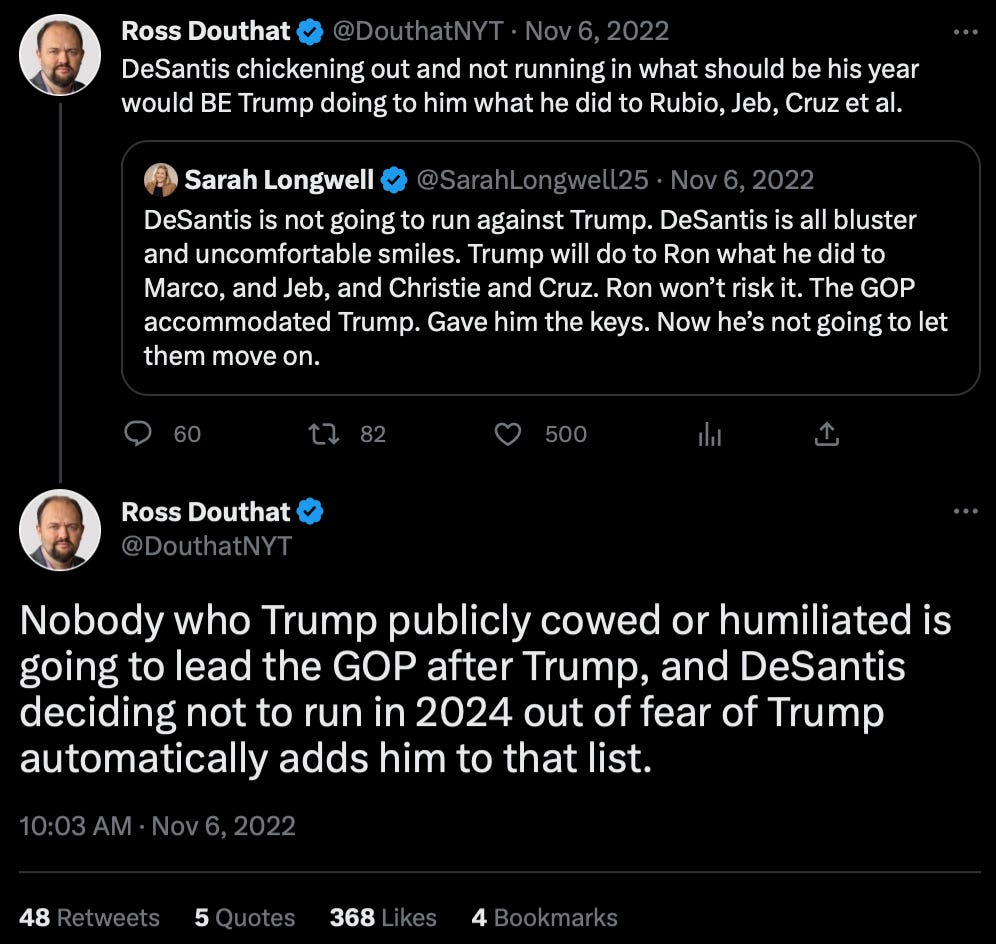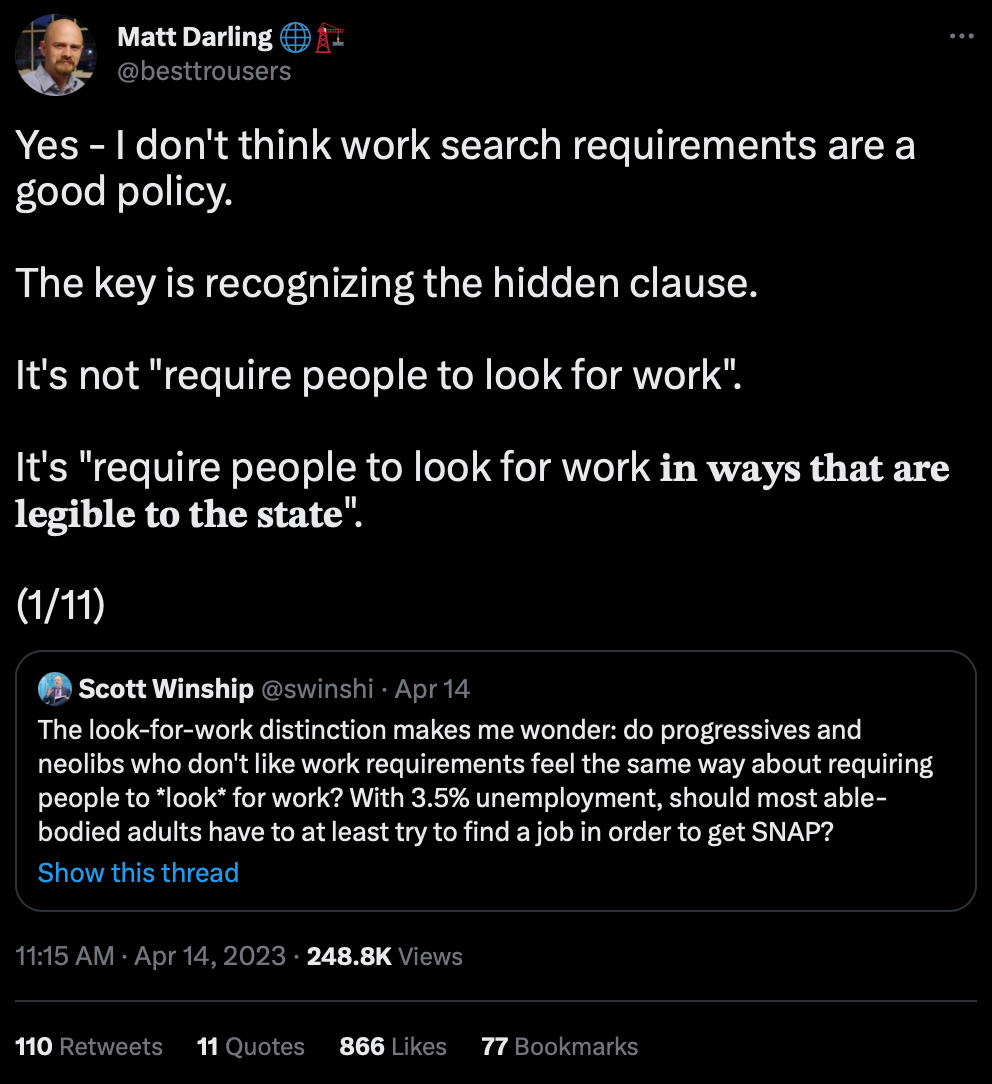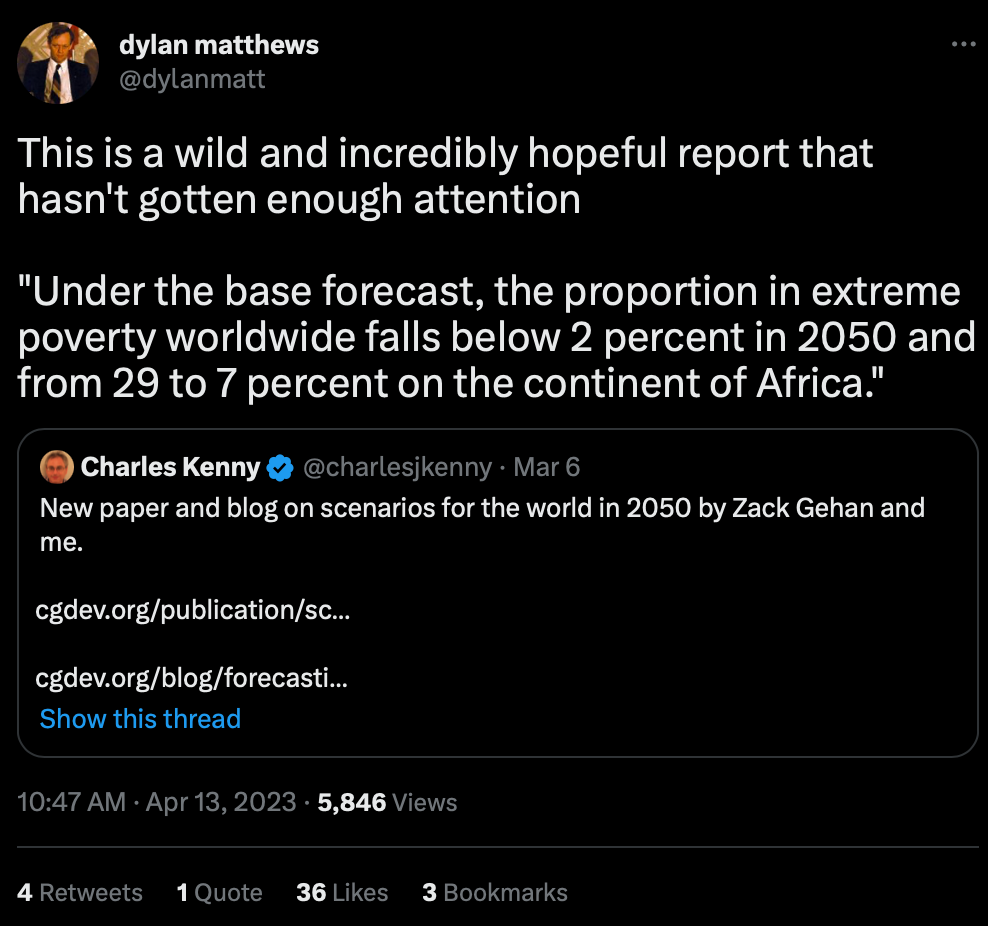The Discourse Report: April 16, 2023
Welcome to DiscRep, Berny Belvedere’s daily guide to the public discourse for Arc members. Got something you think I should include in a future entry? Write me at berny@arcdigital.media. To discuss any of today’s items, post a comment below.
Articles
Ross Douthat’s new column in The New York Times is about Ron DeSantis—specifically, that if he truly wants to be president, then this is his time to run. Douthat previously made this case on Twitter, and I remember thinking that his reasoning was entirely correct.
Douthat has fleshed out his argument a bit more here. Every single cycle there are candidates people expect to be in the mix 4, 8, 12 years down the line … and then, for a variety of factors, their window just closes. If DeSantis wants to be president, there is no evidence he will have a more favorable window at any point in the future.
[T]he liberal Bill Scher, writing in The Washington Monthly, argues that Trump looks too strong, that there isn’t a clear-enough constituency for DeSantis’s promise of Trumpism without the florid drama, and that if DeSantis runs and fails, he’s more likely to end up “viciously humiliated,” like Trump’s 2016 rivals, than to set himself up as the next in line for 2028.
Then from the right, writing for The Spectator, Daniel McCarthy channels Niccolò Machiavelli to argue that while DeSantis probably will run, he would be wiser to choose a more dogged, long-term path instead — emphasizing “virtu” rather than chasing Fortune, to use Machiavelli’s language. In 2024 Trump might poison the prospects of any G.O.P. candidate who beats him, while Joe Biden could be a relatively potent incumbent. But if the Florida governor continues to build a record of conservative accomplishment in his home state, “2028 would offer a well-prepared DeSantis a clear shot.”
I think they’re both wrong, and that if DeSantis has presidential ambitions he simply has to run right now, notwithstanding all of the obstacles that they identify. My reasoning depends both on the “Fortune” that McCarthy invokes and on an argument that Scher’s piece nods to while rejecting: the idea that presidential candidates are more likely to miss their moment — as Chris Christie did when he passed on running in 2012, as Mario Cuomo did for his entire career — than they are to run too early and suffer a career-ending rebuke.
Informative piece in FiveThirtyEight by Aaron Bycoffe, Maggie Koerth, Elena Mejía, and Amelia Thomson-DeVeaux on the legal status of abortion within various state legislatures, and how that impacts people affected.
In The Dispatch, Jonah Goldberg details how MAGA personalities are inverting the moral order: calling enemies good and calling allies bad.
If all Teixeira did was boast about how he gets to see cool stuff at work, without ever disclosing said cool stuff, we’d have never heard about it. Even if he somehow got in trouble for disclosing he had access to stuff he’s not supposed to disclose, it would have been so mundane that no one outside his superior officers and unit members would care much. The Washington Post isn’t going to publish a frontpage story with the headline, “Insecure 21-year-old disciplined for bragging that he has access to classified information.”
But that’s not what he did. He’s accused of one of the biggest leaks of classified intelligence in American history. He’s done real damage that could cost lives. And it wasn’t some one-off, spur-of-the-moment error in judgment. He “told the group he toiled for hours writing up the classified documents to share with his companions in the Discord server he controlled.”
What makes him a loser is that he thought the benefits of impressing a bunch of teenagers outweighed the potential costs. Tom Nichols makes a very good point: The thing that unites Teixeira with other famous recent leakers—Chelsea Manning, Edward Snowden, and the ironically named Reality Winner—is narcissism. They all thought their narrow needs and ambitions were more important than the damage they were doing. You might argue that the other “whistleblowers” had loftier rationales for what they did, but they still thought that they were uniquely qualified to make judgements that harmed the country and real human beings.
In The Washington Post: “The Military Loved Discord for Gen Z Recruiting. Then the Leaks Began.” Drew Harwell:
For years, the U.S. military has pushed to meet prospective Generation Z recruits on Discord, the online group-chat tool where many spend their time. It even runs a 17,000-member chatroom there for service members to talk about first-person shooter games, meet with career counselors and participate in what one sergeant in 2019 called the “Army of tomorrow.”
But Defense Department officials have also struggled to confront the risks of how Discord’s closed channels operate — and the ease with which they can be used to expose military intelligence. Last month, in a detailed guide aimed specifically at Discord users, Special Operations Command, which oversees the country’s most elite forces, told service members: “Don’t post anything in Discord that you wouldn’t want seen by the general public.”
By then, hundreds of classified documents had already spilled onto a Discord server frequented by a 21-year-old National Guard airman, Jack Teixeira, who had used the government secrets, interviews and an FBI charging document suggest, to impress the teenagers and 20-somethings who’d joined the chatroom.
Notes
Tweets
Clips
How Ukrainian Soldiers Are Training to Face Trauma (The New York Times)






I think Jonah does an incredible disservice with the false equivalency between leakers. IIRC, Snowden is the only one of the four he named who had a federal court back him and say, Yes, the govt was doing something illegal here. Yes, they all made a determination the cost is worth the risk. But we can judge whether we think one rationale is loftier than the other. That's exactly what we should be doing when determining what whistle-blowers deserve our understanding, leniency, clemency or what have you